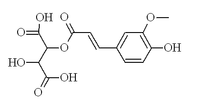Fertaric acid
From Wikipedia, the free encyclopedia
| Fertaric acid | ||
|---|---|---|
 | ||
| IUPAC name 2-hydroxy-3-{[(2E)-3-(4-hydroxy-3methoxyphenyl)prop-2-enoyl]oxy}butandioic acid | ||
| Identifiers | ||
| Jmol-3D images | Image 1 | |
| ||
| Properties | ||
| Molecular formula | C14H14O9 | |
| Molar mass | 326.25 g/mol | |
| Except where noted otherwise, data are given for materials in their standard state (at 25 °C (77 °F), 100 kPa) | ||
| Infobox references | ||
Fertaric acid is a hydroxycinnamic acid found in wine and grape.[1] It is an ester formed from ferulic acid bound to tartaric acid.
It is a metabolite of caftaric acid after catftaric acid was fed in rats. Fertaric acid is then found in plasma, kidney and urine.[2]
References
- ↑ Branka Mozetič, Irma Tomažič, Andreja Škvarč and Polonca Trebše (2006). "Determination of Polyphenols in White grape Berries cv. Rebula". Acta Chim. Slov. 53: 58–64.
- ↑ Vanzo, A; Cecotti, R; Vrhovsek, U; Torres, AM; Mattivi, F; Passamonti, S (2007). "The fate of trans-caftaric acid administered into the rat stomach". Journal of agricultural and food chemistry 55 (4): 1604–11. doi:10.1021/jf0626819. PMID 17300159.
| |||||||||||||||||||||||||||||||||||||||||||||||||||||||||
This article is issued from Wikipedia. The text is available under the Creative Commons Attribution/Share Alike; additional terms may apply for the media files.